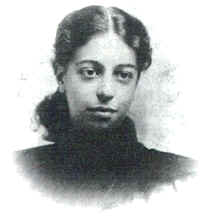Angelina Weld Grimke
| Angelina Weld Grimké | |
|---|---|
 |
|
| Born |
February 27, 1880 Boston, Massachusetts, USA |
| Died | June 10, 1958 (aged 78) New York City, USA |
| Education | Boston Normal School of Gymnastics, later Wellesley College |
| Occupation | Author, journalist, poet |
Angelina Weld Grimké (February 27, 1880 – June 10, 1958) was an American journalist, teacher, playwright and poet who came to prominence during the Harlem Renaissance. She was one of the first Woman of Colour/'Mulatta' women to have a play publicly performed.
Angelina Weld Grimké was born in Boston, Massachusetts, in 1880 to a biracial family. Her father, Archibald Grimké, was a lawyer and also of mixed race, son of a white planter. He was the second African American to have graduated from Harvard Law School. Her mother, Sarah Stanley, was European American from a Midwestern middle-class family. Information about her is scarce.
Grimké's parents met in Boston, where he had established a law practice. Angelina was named for her father's paternal white aunt Angelina Grimké Weld, who with her sister Sarah Grimké had brought him and his brothers into her family after learning about them after his father's death. (They were the "natural" mixed-race sons of her late brother, also one of the wealthy white Grimké planter family.)
When Grimké and Sarah Stanley married, they faced strong opposition from her family, due to concerns over race. The marriage did not last very long. Soon after their daughter Angelina's birth, Sarah left Archibald and returned with the infant to the Midwest. After Sarah began a career of her own, she sent Angelina, then seven, back to Massachusetts to live with her father. Angelina Grimké would have little to no contact with her mother after that. Sarah Stanley committed suicide several years later.
Angelina's paternal grandfather was Henry Grimké, of a large and wealthy slaveholding family based in Charleston, South Carolina. Her paternal grandmother was Nancy Weston, an enslaved woman of mixed race, with whom Henry became involved as a widower. They lived together and had three sons: Archibald, Francis and John (born after his father's death in 1852); they were majority white in ancestry. Henry taught Nancy and the boys to read and write. Among Henry's family were two sisters who had opposed slavery and left the South before he began his relationship with Weston; Sarah and Angelina Grimké became notable abolitionists in the North. The Grimkés were also related to John Grimké Drayton of Magnolia Plantation near Charleston, South Carolina. South Carolina had laws making it difficult for an individual to manumit slaves, even their own children born into slavery. Instead of trying to gain the necessary legislative approval for each manumission, wealthy fathers often sent their children north for schooling to give them opportunities, and hoping they would stay to live in a free state.
...
Wikipedia
